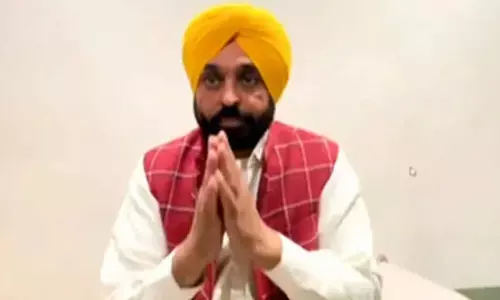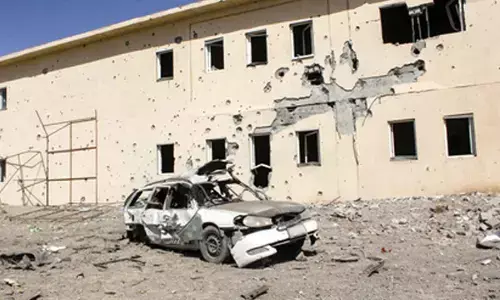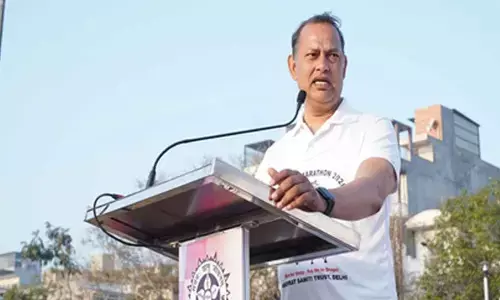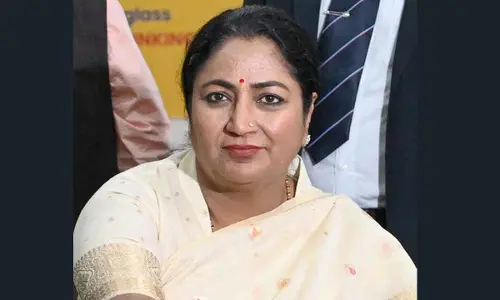MyVoice: Views of our readers 16th October 2022

MyVoice: Views of our readers 16th October 2022
MyVoice: Views of our readers
Nation needs alternative agenda for uplift of poor
Apropos "A big gamble or an astute strategy" (8 Oct). I would like to repeat the last para "Time will tell whether KCR's gamble of renaming the party will help in achieving his ambition or will turn out to be a misadventure" of well-analysed thoughts by the author. To answer this question, one has to go back to the era when INC was in power under Indira Gandhi who was considered one of the strongest PMs of India. Indira who was considered as "Goongi Gudiya" by senior leaders of Congress then turned out to be "Durga" a name used by late Atalji when she managed to win the war over Pakistan which led to the creation of Bangladesh.
When Indira was turning stronger, somewhere hunger for power turned her arrogant leading to declaration of Emergency. The first serious attempt to unite the fragmented opposition parties was none other than selfless socialist leader Jayaprakash Narayanan. In fact, when the then opposition parties Congress (O), Jan Sangh, Left parties and others were fighting a political battle in UP who launched the "Nav Narman'' movement in Gujarat which led to resignation of Gujarat government, it was exploited by parties like Jan Sangh and others. When the JP movement was at its peak and got overwhelming support from youth, workers and common people, the Congress government under Gandhi turned shaky, she enforced Emergency and the rest is history.
The Emergency was a bitter lesson for opposition parties and under JP's leadership all fragmented non left agreed to merge their party under the name "Janata Party'' and people like me and lakhs others gave wholehearted support and the party did manage to dislodge Gandhi from power. However JP's dream of keeping the parties united got into the drain as Jan Sang refused to give up their affiliation with RSS when the question of dual membership was raised by other groups of parties. It was indeed sad that the first serious attempt failed because the parties merged were hungry for power and were unwilling to give up religious ideology.
The failure also saw the birth of regional parties which have now further fragmented with every such party with a narrow regional agenda. This is what is now being exploited by BJP as they now claim to occupy center-stage at the national level as Congress still needs to find a credible face to take on Modi. The renamed BRS under KCR is yet to announce a national agenda and alternative programme for the betterment of the people. However, at the moment it looks like the party seems to have been renamed with a narrow agenda to defeat Modi. Like Indira Gandhi, Modi will gain sympathy and like her he may raise slogan "mein garibi hatanay ka kaam mein laga hoon woh log Modi hatanay kaam kar rahein hai." So, it is indeed wait-and-watch situation indeed.
– N Nagarajan, Hyderabad
Who is a strong contender to Modi?
Various surveys conducted during the last 8 years have indicated an unparalleled performance put up by the PM Narendra Modi. An opinion has been made out confirming lesser electoral prospects for Modi in
2024 elections. The middle class vote-bank forms the base for the ruling BJP whose policy decisions are breaking the back of the middle class that is burdened with issues like bank deposit schemes, hiked gas cylinder rates and uneven GST rates.
Even against such a backdrop, though the opposition has been trying to defeat Modi in 2014 elections, a person to replace him is conspicuous by an absence at the national level. Also, the national party of Congress has been facing the leadership crisis and lack of unity among leaders. Hence, Vox Populi is turning favourable towards regional party leaders. The prominent leaders who could give a tough fight to Modi in the race are Kejriwal and Mamata Banerjee as indicated in the national surveys. The regional parties are advantaged due to Congress getting weaker at the national level.
As exemplified by Modi, a leader excelling as CM at the State level can be fit to shine at the national level. The BJP which is winning in the Lok Sabha elections is unable
to defeat regional party leaders at the State level, which is a proven fact in the case of Bengal, Delhi and Odisha States. It is a pity that Congress is in power only in two states while the regional parties are in power in 8 states. While communists are holding power in only one state, the remaining 18 states are ruled by the BJP. Barring one or two CMs of BJP-ruled states who are popular, the remaining CMs are dormant in the scene
since their performance is not up to the mark.
The CMs who are aspiring for the PM post and are making hullabaloo are KCR and Nitish Kumar who are unfortunately not among the top ten CMs as mandated by
the voters. The most popular CM is Naveen Patnaik of Odisha. The CM of TN, Stalin and CM of AP Jagan are amazingly at 4th and 5th ranks in popularity index at the all India level. Karnataka CM is in the 10th position among popularity ratings. Unfortunately, KCR who has been
boasting about himself has seldom made it to the top ten of any category, as there is people's apathy against the family rule unleashed by him in the State. All in all, surveys help in gauging performance of the CMs and provide better opportunities for showing good governance.
- Bh Indu Sekhar, Hyderabad
Farm land vanishing, thanks to realtors
It is funny when some politician or a bureaucrat talks about the food-securing or a farmer-friendly government. Just look at the open grounds and agricultural lands in your cities and even rural areas; all those areas once fertile fields are being sold off as housing plots. If we notice that in the last few years the speed with which agricultural lands being sold off really scares us. If this unchecked trend continues, probably in another decade time, almost all he fields will become plots and soon our government may be forced to import food grains form other courtiers.
Today, real estate is a money minting business. From politicians, film starts and even the lowest paid staff of offices and rowdy elements are all in to the land brokering. But the tragic truth is that this business while helping a few to flourish monetarily is destroying the livelihood of thousands of food producers in our country. The professional rear estate brokers lure farmers to sell their land at low prices and later fill the field with rubbish and convert them into commercial plots quoting a high price. Right from the local MLAs to the village-level officials, all are hand in glove in the business.
Take the case of delta regions today. Some years back, most of the paddy came from that area, but today you can see vast tracts of land lying barren, uncultivated or weed growing. Even if water is available farmers are not willing to cultivate because they are not able to source labour, and won't even get a good price for the produce. In my city of Kakinada, there used to be lush green fields feasting the eyes between Kakinada town and Pithapuram and Samalkot, as most of the agricultural lands are covered into the plots and the entire stretch is made barren with site markings with attractive hoardings to sell plots.
It is high time every state government enact a law that agricultural lands cannot be converted to housing plots and sell to realtors. It is unfortunate no government bothers to prevent the sale of fields as plots. In short, there is no governance, only politicking. Our elected representatives are only interested in ribbon cutting and posing for photos rather than addressing out problems. What can poor farmers do? Will their voice be heard in the portals of power? I know, it's a cry in the wilderness, yet, it is a vital issue to be addressed by respective state governments on priority basis.
– Rama Krishna M, Kakinada
Bad police get just desserts
Political thinkers and Constitutional experts often say that the success of a democracy in a sense depends on two officials in any government. In our Indian context, they are District Collector and Sub-Inspector. These two officials are expected to implement and to oversee the implementation of the Constitutionally assured rights, do justice to the common man, among other things. Knowing the importance of their roles, many Civil Servants and police personnel discharge their duties with commitment and sincerity. Some of these officers often stick to their guns, question the actions of even their bosses, and face dire consequences.
Remember, the daring IPS officer, D Roopa, from Karnataka, known for her probity and sincerity, who has got transferred 40 times in her 20 years of service. Who will forget the handful of sincere police officers who saved many people belonging to the Sikh community from certain death during the 5 day bloody riots in 1984? But, alas, some police personnel in Telangana are in the news these days for wrong reasons.
The Telangana police department has dismissed about 50 police men from service in a short period of ten months this year for various reasons. Misbehavior, misuse of power, and dereliction of duties are some of the reasons cited for sacking them. Some Circle-Inspectors and Sub-inspectors too implicated innocent people in cases and tortured them till they fell in line. Some of them even had kidnapped people, put them in wrongful confinements, molested them and often indulged in extortion. Some police officials had joined hands with notorious criminals, aided them and abetted criminal actions.
What is most disgusting is when police men misbehave with their female colleagues and with women who come to them seeking help and justice. Who will forget the indecent incident some years ago of a sitting DGP in the Punjab patting on the buttocks of a woman IAS officer! In Telangana on many occasions, officers at station-level physically harassed female officers and demanded sexual favors from them. Some of them ditched female subordinates in the name of love and marriage. Such things are most unbecoming of a police officer. Hence all of them have been 'fired'.
The infamous case of CI Nageswara Rao put the entire department in a tight spot. He raped a woman, held her husband at his house and made him work for peanuts. He was even about to kill both of them but some providential powers helped them escape from his devilish clutches. In his case the dismissal from service is like a rap on the wrist. People like him don't deserve any sympathy or support. And such warts in the department, if any left, do get their just desserts soon.
– M Somasekhar Prasad, Hyderabad
SC must deliver its ruling on EPS issue
Employees Pension Scheme 1995 (EPS-95) is a cruel decision taken by the Government of India for evading the subsequent pension benefits. There are about 70 lakh public sector retirees existing in India. The lowest static pension being paid for more than two decades is only Rs1,000 without any hike. Upon numerous representations to the GOI, all leaders promised to look into but no action. BJP leader Javadekar in 2013 made an election promise to revise it to Rs 3,000 if his party came to power but he later conveniently overlooked. The then Labour Minister Bandaru Dattatreya and many MPs raised this issue in every Parliament Session but no result. BJP MP Hemamalini personally met PM only to get a positive response with a negative result.
When the then CJI NV Ramana was met by National Agitation Committee members, he patiently heard and constituted a bench with three judges under the head of Justice UU Lalit who heard the arguments of lawyers appointed by NAC side and GOI side in detail and at length and a judgement was finalised more than two months ago, but it is kept under reserved mode. How long can a judgment be kept in reserved position?
Some judges say that no judgment shall remain reserved beyond two months. Long delay in pronouncing verdicts would cause trouble to litigants and judges may not remember any of the arguments. SC also disapproved a long delay in delivering verdicts. Judge UU Lalith who is now holding the post of CJI is earnestly urged to pronounce the reserved Judgment at the earliest as his tenure as CJI is ending in the first week of November this year.
– Dr NSR Murthy, Secunderabad
Indian economy fast slipping into recession
Due to escalation of Ukraine war, there are chances of further contraction of world economy which is already in recession. Many countries are taking preventive steps to check further erosion of economy and already imposed ban on export of wheat and non-basmati rice. Gloomy clouds continue to hover over the economic landscape and international agencies have downgraded their growth forecast. There is outflow of funds which is required to be discouraged by taking appreciate steps. Steps should be taken to minimise the imports.
While the World Bank scaled down the forecast to 6.5% for the current fiscal from its earlier estimate of 7.5%, announced in June, the United Nations Conference on Trade and Development (UNCTAD) has said the GDP growth is expected to decelerate to 5.7% in 2022 from 8.2% last year due to higher financing costs and weaker public expenditures. Last week, the Reserve Bank of India too cut its growth forecast to 7% from an earlier estimate of 7.2% after increasing the repo rate by 50 basis points to 5.9% to fight inflation. Another area of concern is that the services sector activity fell to a six-month low in September due to a cooling in demand amid soaring prices. High inflation and low demand pulled India's factory growth to a three-month low in September. Private sector sales rose at the weakest pace in six months. Fewer jobs were created compared with August.
One more negative news for India is that OPEC countries had decided to cut the production of oil. Due to climate change there is adverse impact on the yield of the crops and scientists should find the ways how to control it. Thousands and thousands students are going to foreign countries and with this result huge foreign exchange is going to other countries and the government should frame the policy to this trend. Various deposit schemes be started to attract the deposit of Indians settled in other countries. By taking such positive initiatives country can tackle the expected recession but there should be end of Ukraine war.
– Yash Pal Ralhan, Jalandhar
Mental ill-health silently turning major epidemic
Mental health issues are on the rise across the globe. According to reports, mental disorders are now among the leading causes of global health burden, with no evidence of global reduction since 1990. The World Health Organization (WHO) estimated that one in every eight people worldwide suffers from a mental disorder in a major report released on June 17, 2022. According to a study published in the Lancet in October 2021, there is a 35% increase in mental health disorders in India. A 2019 WHO estimate puts the economic cost of mental health conditions in India between 2012 and 2030 at around $1.03 trillion. It is also estimated that nearly 38 million people in the country suffer from anxiety disorders, with an additional 55 million suffering from depression. It has an impact not only on the individual but also on the country's overall economy.
There has been a rising understanding of the critical role mental health plays in accomplishing global development goals in recent years, as indicated by the inclusion of mental health in the Sustainable Development Goals. Mental health plays a significant role in today's world. We all struggle with our mental health from time to time. Mental health is important at every stage of life, from childhood and adolescence through adulthood. People frequently suffer in silence and refuse treatment because of stigma and misunderstandings around mental health disorders.
The government is planning to launch a national tele-mental health programme and a toll-free helpline number in the near future to improve access to mental health services across the country.
Efforts should be made to educate and upskill communities and society in order to provide clients with timely mental health support and assistance. Nothing short of prompt intervention, awareness and education about the problem, professional assistance, and appropriate policies would help reduce the number. The WHO's "World Mental Health Report: Transforming Mental Health for All" encourages all nations to move quickly with the action plan's implementation. All nations should respect the WHO's appeal to improve mental health services so that the complete range of mental health needs is served by a network of locally based, easily accessible, reasonably priced, and high-quality services and supports.
– Dr Krishna Kumar Vepakomma, Hyderabad








